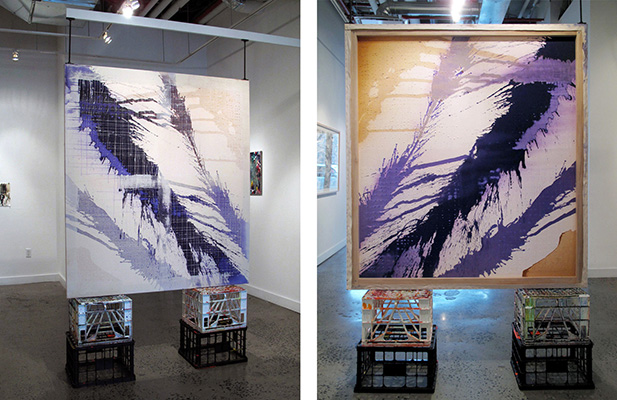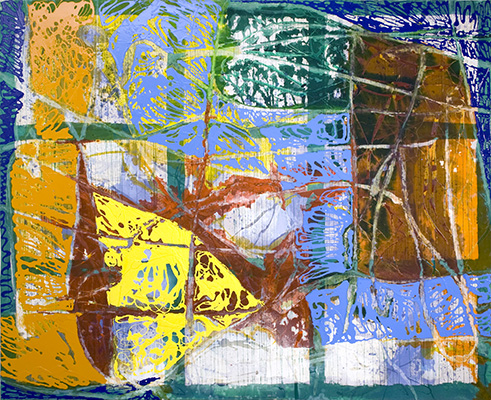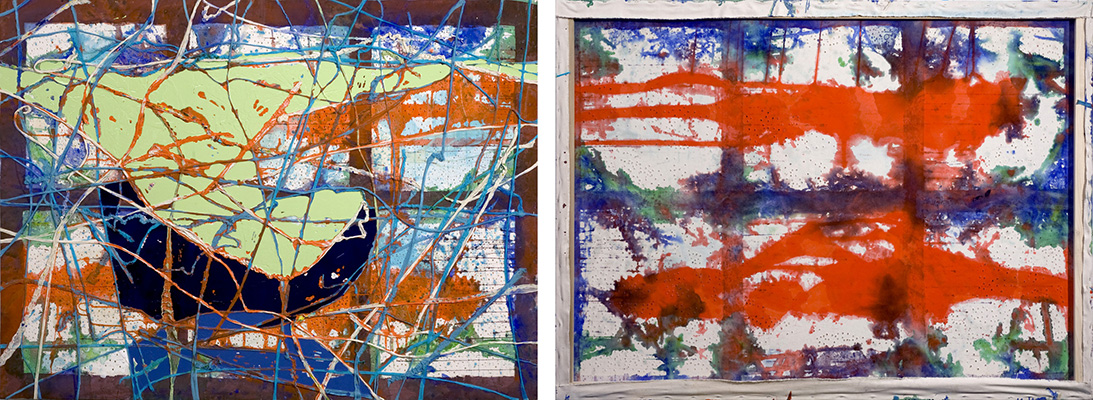
Quill, 2012, acrylic on canvas, 54 x 50 inches.

Roman Luther, 2011, acrylic on canvas, 88 x 108 inches.

The Plain Plane, 2011, acrylic and fabric on canvas. 58 x 78 inches.
BIOGRAPHY
Dona Nelson is an artist based in New York City. Her work has been featured in solo exhibitions at Espace Tajan, Paris (2019), The Tang Museum, Skidmore College, Saratoga Springs, NY (2018), Weatherspoon Art Museum, Greensboro, NC (2000), and Michael Benevento Gallery, Los Angeles (2019), among others. She is the recipient of many grants and awards, including Anonymous Was A Woman (2015), Foundation for Contemporary Arts Award (2011), and a Guggenheim Memorial Fellowship (1994). Nelson’s work is included in the collections of the Metropolitan Museum of Art, Guggenheim Museum, Pennsylvania Academy of Fine Arts, Rose Art Museum, Museum of Fine Arts Boston, Perez Art Museum, Kadist Foundation, Weatherspoon Art Museum, Albright-Knox and Art Gallery of New South Wales, Australia.
PRESS RELEASE
ARTISTS’ LEGACY FOUNDATION 2013 ARTIST AWARD – $25,000 TO DONA NELSON
OAKLAND, CALIFORNIA—The Artists Legacy Foundation is pleased to announce its seventh annual Artist Award will be presented to noted American painter Dona Nelson on November 2, 2013. The purpose of the Artist Award is to recognize and honor the career and accomplishments of an outstanding visual artist whose primary medium is painting or sculpture.
Established in 2007, the Artist Award annually provides an unrestricted $25,000 award to one artist in order to encourage his or her creative pursuits. Ten to fifteen painters and sculptors are anonymously nominated and candidates are unaware that they are under consideration. Nominators and jurors are art world peers with expertise in their fields. The Foundations 2013 panel of jurors included painter Ron Bechet, visual artist Sarah McEneaney, and Berkeley Art Museum Director Larry Rinder.
When informed of the award this summer, 2013 Artist Award recipient Nelson was navigating a heat wave in Philadelphia, her air conditioner on the fritz, and packing up paintings for a group show in the fall. Overwhelmed, she said, “The timing couldn’t be better.”
Regarded as one of the most vital, intellectually considered, aggressively tactile, and physically inventive American painters of her generation, Nelson is a 2011 Foundation for Contemporary Arts grant recipient and has received institutional solo exhibitions at The Weatherspoon Art Museum at the University of North Carolina in Greensboro and The Morris Gallery at the Pennsylvania Academy of Fine Arts in Philadelphia. An influential educator, she is a Professor of Painting and Drawing, Tyler School of Art, Temple University, in Philadelphia. Critic Roberta Smith noted in The New York Times: “Nelson has painted prolifically and innovatively for nearly 40 years, following her own path through the gap between abstraction and representation.”
Nelson describes her practice as an investigation: “In paintings, my own, and others, I am interested in imagination coupled with a quality of facticity. I have no over-riding ideology about painting. I don’t know how it relates to culture, because I can’t see paintings in photographs. I am a woman, but I don’t know how that fact impacts my studio practice. I think even mild, general, ideas about gender identity and other aspects of “identity” are inhibiting, indeed hostile, to artistic exploration. What my paintings are, in relation to who I am, remains a mystery to me.”
And continues, “I start my two sided paintings by stretching one side and working on it for a while, and then reversing the canvas on the stretcher and working on the other side for a while, and I work back and forth that way, until I feel that there is a front side of the painting and a back side. From then on, the front is always the front of the painting and the back is always the back of the painting, but I often continue to work back and forth from one side to another. I never try to ‘improve’ one side of the painting independently of the other. I do not consider these works to be deconstructions of the form, Painting, or sculptures, though one can walk around them. The sides of the paintings are often very different from each other, and that interests me – the way in which two very different visual and physical manifestations can be inseparable from, and, indeed, create each other.”
